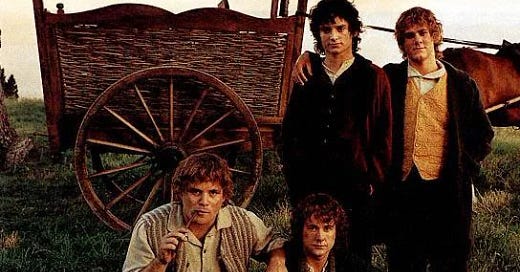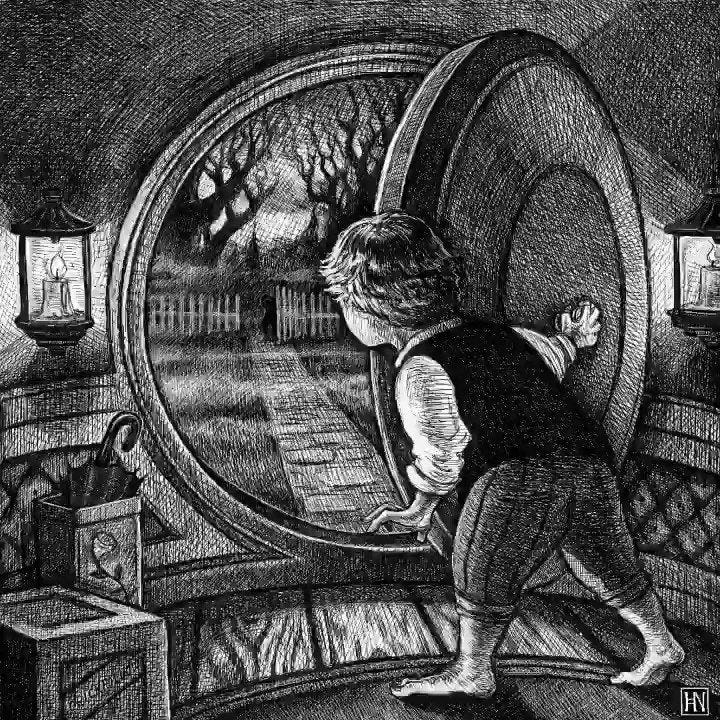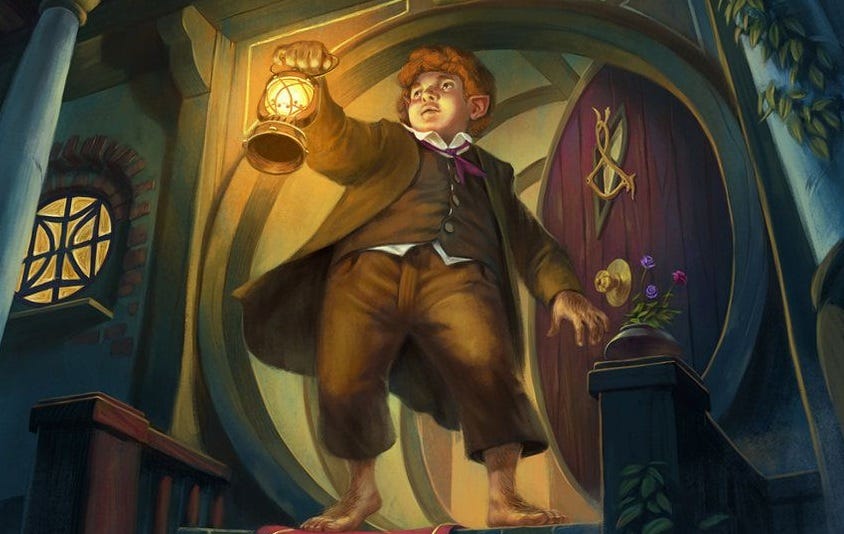The Courage to Admit Fear
how a little known character from The Lord of the Rings teaches us to have both empathy and bravery to combat darkness in whatever ways we can
“ ‘I wish it need not have happened in my time, said Frodo.
'So do I,' said Gandalf, 'and so do all who live to see such times. But that is not for them to decide. All we have to decide is what to do with the time that is given us.” - The Fellowship of the Ring, Chapter: The Shadow of the Past, J.R.R. Tolkien
In the story of The Lord of the Rings, the names Samwise, Merry and Pippin are all familiar to us within Frodo Baggins’ close-knit friend group. But what if I told you there was another Hobbit who was also Frodo’s friend that many people are unaware of?
His importance to the story is often overlooked, but is undoubtedly something Tolkien deemed necessary to include. Learning about him gives us insight into how Tolkien prioritized compassion and mental health in his characters (even if he may not have used that modern term).
Hello and welcome to Many Meetings, the heart of Tolkien-dom on Substack!
I’m Breanne, a new-ish substacker, but a lifelong Tolkien fan. This space is one I’ve created to welcome others into these beautiful stories, sometimes on walks with my dog and sometimes in a quiet corner of your inbox.
When I’m not doing read-throughs, I also post essays and deep-dives inspired by the works of Tolkien like this one. Enjoy!
Who is this other Hobbit within Frodo’s friend group? Though barely mentioned in the films by Peter Jackson1, he’s written heroically in the book. If you’ve only seen the movies, this character might be a new one for you and if you’re a long-time fan, they might be someone you forgot about.
Take your seat in our virtual Hall of Fire here at Many Meetings2 and let’s do a deep dive on this brave character. Today’s post is all about Frodo’s dear friend: Fredegar (Fatty) Bolger.3
No Hobbit is an Island
When Frodo is informed by Gandalf that the ring Bilbo passed on to him is indeed the One Ring, he attempts to leave the Shire without raising suspicion. He knows he can’t do this without the help of his friends, and so, Sam, Merry, Pippin and Fredegar Bolger jump in to help Frodo move to Buckland.
Frodo sells his beloved home of Bag End to the Sackville-Bagginses. He then has the tedious job of selling everything else he can and packing up what is left to take it to the home Merry has purchased for him in Buckland. And Fredegar is there every step of the way. Not only does he help in packing up all of Frodo’s things, but he also goes ahead with Merry to Buckland to help Merry set up Frodo’s new house before he gets there.
In the books, Frodo has no intention of staying in Buckland. He’s simply making it appear that way to raise less suspicion when he actually does leave the Shire. This ruse is a plan suggested by Gandalf. Frodo is to leave Bag End and move quietly back to Buckland. From there, he can sneak out to the borders of the Shire instead of instantly disappearing like Bilbo did (which caused quite the uproar!).
At this point in the story—from Frodo’s perspective—no one else knows he’s carrying the One Ring besides himself, Gandalf and Sam. He’s quite surprised when he arrives in Buckland to discover his friends knew what he was planning all along and some of them are determined to go with him.
“ 'But it does not seem that I can trust anyone, said Frodo.
Sam looked at him unhappily. 'It all depends on what you want, put in Merry. You can trust us to stick to you through thick and thin - to the bitter end. And you can trust us to keep any secret of yours - closer than you keep it yourself. But you cannot trust us to let you face trouble alone, and go off without a word. We are your friends, Frodo. Anyway: there it is. We know most of what Gandalf has told you. We know a good deal about the Ring. We are horribly afraid - but we are coming with you; or following you like hounds.' “ –The Fellowship of the Ring, Chapter: A Conspiracy Unmasked, J.R.R. Tolkien
Fredegar’s Choice
After Frodo’s friends unmask the conspiracy they formed to help him, Fredegar bravely admits he will not be following them into the Old Forest.
“I am more afraid of the Old Forest than of anything I know about…”-Fredegar, The Fellowship of the Riing, Chapter: A Conspiracy Unmasked, J.R.R. Tolkien
Instead, he volunteers himself for another task: he will remain in the home Frodo purchased in Buckland and keep up the pretense that Frodo is still living there.
Fredegar’s choice to admit to his friends that he’s not able to accompany them into the Old Forest is particularly interesting to me. He’s not painted as a coward for this, but courageously written as being willing to do what his personal fortitude would allow. His choice to stay brings to mind another scene Tolkien writes later on in the story.
In the Return of the King, we read of Aragorn mercifully giving the soldiers marching towards the Black Gate the option to turn back once he sees the terror and mental anguish they’re experiencing. He gives them a ‘manful task within their measure’4 to accomplish and many of them do so.
Tolkien intentionally writing these scenes with Fredegar and the men who left Aragorn to defend the crossroads at Cair Andros tells me just how much empathy he had towards the mental state of someone being overwhelmed by fears too big to conquer. Tolkien didn’t shame them for feeling those emotions, rather, he modeled showing mercy and honoring them in his writing.
An Unsung Legacy
Fredegar plans to stay behind so he can answer the questions of inquisitive folk who might wonder what Frodo is doing in Buckland. He even goes as far as to keep some of Frodo’s old clothes to play the part of Frodo living in the new house. He is successfully able to do this to the point of putting his own life in danger.
In one of the most chilling scenes in the book, the Nazgûl show up to the house where they think Frodo is now living. Fredegar is able to escape in the nick of time and alert Buckland to their presence. The Black Riders continue on their pursuit of Frodo but not before Fredegar bought his friends valuable time.
We don’t hear of Fredegar again until after the book is nearly over. When Frodo, Sam, Merry and Pippin return to Shire to free it from the grip of Saruman and Gríma Wormtongue at the Battle of Bywater, they find Fatty Bolger again.
“The day after the battle Frodo rode to Michel Delving and released the prisoners from the Lockholes. One of the first that they found was poor Fredegar Bolger, Fatty no longer. He had been taken when the ruffians smoked out a band of rebels that he led from their hidings up in the Brockenbores by the hills of Scary.” –The Return of the King, Chapter: The Grey Havens, J.R.R. Tolkien
This is how we learn that Fatty Bolger had not been idle while Frodo and his friends were gone. He continued to play his part in the fight against evil by leading a rebellion to oppose the tyranny of Saruman. He might not have felt up to venturing into the dark of the Old Forest, but he rose to the occasion to fight the darkness when it came to his homeland.
Even after his terror of experiencing the Nazgûl alone, he continued to find ways to fight against evil in his own way. Maybe his choice to stay behind and help in the ways he could the first time enabled him to find more courage when life’s circumstances asked it of him again.
The story of Fatty Bolger reminds me of a quote from Elrond:
“ 'The road must be trod, but it will be very hard. And neither strength nor wisdom will carry us far upon it. This quest may be attempted by the weak with as much hope as the strong. Yet such is oft the course of deeds that move the wheels of the world: small hands do them because they must, while the eyes of the great are elsewhere.’ “ –The Fellowship of the Ring, Chapter: The Council of Elrond, J.R.R. Tolkien5
Whether you’ve heard of Fredegar Bolger or he is a new Tolkien character to you, we can all agree that he certainly lived up to Elrond’s words.
May we, like Fredegar Bolger, ‘decide what to do with the time that is given us’. May we find ‘deeds within our measure’ whenever life asks it of us and—more importantly—have the courage to act upon them.
In a blink-and-you’ll-miss-it scene from The Fellowship if the Ring movie, Bilbo greets an older Hobbit at his birthday party, calling him ‘Fatty Bolger’. A tiny nod to this beloved character from the book.
The Hall of Fire is a particular place the House of Elrond. The following is Tolkien’s description (taken from the chapter this substack was named after):
“The doors were thrown open, and they went across a wide passage and through other doors, and came into a further hall. In it were no tables, but a bright fire was burning in a great hearth between the carven pillars upon either side.
Frodo found himself walking with Gandalf. 'This is the Hall of Fire, said the wizard. 'Here you will hear many songs and tales - if you can keep awake. But except on high days it usually stands empty and quiet, and people come here who wish for peace, and thought. There is always a fire here, all the year round, but there is little other light.’" –The Fellowship of the Ring, Chapter: Many Meetings, J.R.R. Tolkien
A version of this essay was published on this Substack last year. I’m currently recovering from the flu and hope you enjoy this updated re-post.
This part of the story can be found in the chapter: ‘The Black Gate Opens’ in The Return of the King.
“…another main point in the story for me is the remark of Elrond in Vol. I: Such is oft the course of deeds that move the wheels of the world: small hands do them because they must, while the eyes of the great are elsewhere. Though equally important is Merry’s remark (Vol. III p. 146): the soil of the Shire is deep. Still there are things deeper and higher; and not a gaffer could tend his garden in what he calls peace, but for them.)” J.R.R. Tolkien, Letter 186







Love this. I've always thought of him as incredibly brave to face the Nazgul at his door. We all have different types of bravery, and being afraid of some things over others isn't cowardice.
I heart Fatty Boldger! I aso love Tolkien’s affectionate naming of characters “Fatty” (see: Lumpkins, and the Laird of Lossarnach, and his absolute unit of a horse, at the siege of Gondor) and theres an air of prowess, strength and steadfastness to each of these, even though their parts are small. Small parts in the story matter, and it’s one of the things about Tolkien’s work that continues to inspire and remain prescient.